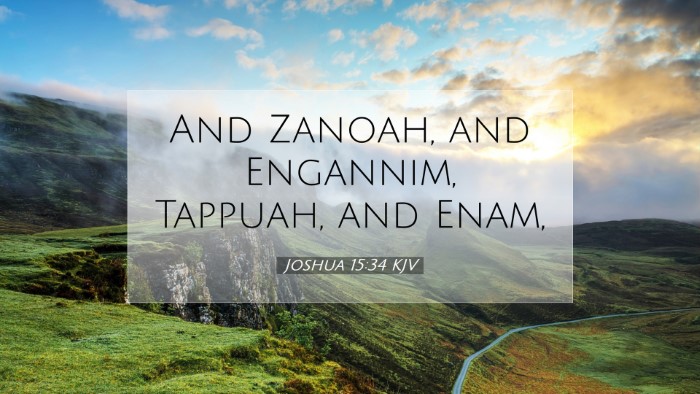Commentary on Joshua 15:34
Introduction
Joshua 15:34 is a significant verse within the wider context of the Book of Joshua, specifically addressing the delineation of the tribal territories assigned to the tribe of Judah. This verse reads: "And Heshbon, and all its towns which were in the plain, and all the kingdom of Sihon, which were in the wilderness." In this commentary, we will draw on a synthesis of public domain commentaries, including those of Matthew Henry, Albert Barnes, and Adam Clarke, to extract insights meaningful to pastors, students, theologians, and Bible scholars.
Contextual Overview
The preceding chapters in the Book of Joshua detail the conquest and allocation of land among the twelve tribes of Israel. The significance of land allocation speaks to the fulfillment of God’s promises to Abraham, Isaac, and Jacob regarding the land of Canaan.
The Importance of Territorial Assignments
The allocation of land is not merely a logistical arrangement but is deeply rooted in Israel’s identity as God’s chosen people. Each tribe's inheritance reflects the sovereignty of God in distributing blessings according to His will.
Exegesis of Joshua 15:34
Geographical Significance
In this verse, particular mention is made to Heshbon, which had been a notable city of the Amorites and later served as the capital of the kingdom of Sihon. The mention of the plains suggests a fertile area, significant for agricultural pursuits, which would have economic implications for the tribe of Judah.
Heshbon's Historical Context
Matthew Henry highlights that Heshbon was once a prosperous city that became a part of the Israelite territory due to military conquest. In this verse, its inclusion symbolizes a victory over past adversities and a claim over the land, capturing the historical struggle faced by the Israelites.
Spiritual Implications
Albert Barnes notes the allegorical significance of land in biblical theology. Land represents God’s promises and blessings, and the inheritance of Judah signifies a larger spiritual inheritance for believers. New Testament theology often draws parallels between the land of Canaan and the spiritual rest and inheritance believers find in Christ.
Theological Reflections
Covenantal Themes
Adam Clarke points out that the territory assigned to Judah is more than a geographical designation; it reflects the covenantal relationship between God and His people. Through the lens of covenant theology, one can observe how God’s promises unfold throughout biblical history, reinforcing the commitment between God and Israel.
Judah's Inheritance
The tribe of Judah, being one of the largest and most prominent tribes, holds a significant place in the genealogy of Christ. This foreshadows the idea that the physical land of Canaan is analogous to the spiritual kingdom that believers enter through faith in Jesus. Growth in faith may be seen as parallel to the Israelites’ journey in claiming their inheritance post-conquest.
Practical Applications
Faith and Inheritance
This commentary is not merely for academic appreciation, but carries practical implications for faith and ministry. Understanding our inheritance in Christ calls for an active faith that engages with God's promises.
- Trust in God's Promises: Just as the Israelites trusted God in their conquest, so too must modern believers trust in God's promises for provision and guidance in their lives.
- Covenant Community: The allocation of land reminds us of being part of a covenant community working towards God’s purposes, fostering unity and collective ministry.
- Spiritual Warfare: Recognizing the historical significance of conflicts that needed to be fought to claim their inheritance can serve as a metaphor for the spiritual battles believers face today to walk in the fullness of faith.
Conclusion
Joshua 15:34 serves as a pivotal verse that reflects God's faithfulness in fulfilling His promises. Combining historical insights with theological reflections deepens our understanding of the text, inviting us into the broader narrative of Scripture where land, promise, and faith converge. For pastors, students, theologians, and scholars, this verse serves as a reminder of the God who leads His people into their promised inheritance, encouraging believers to actively lay claim to the blessings available through faith.


